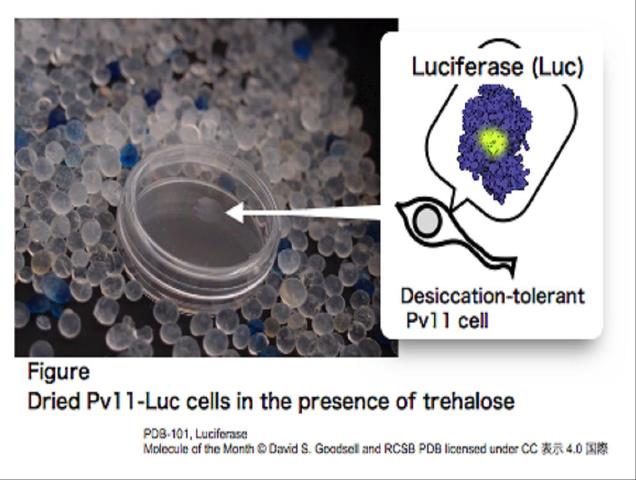Dry-preservation at room temperature of desiccation-sensitive enzyme in air-dried insect cells
July 28, 2017
A research group of Assistant Professor Shingo KIKUTA (Division of Sciences for Biological System, Institute of Agriculture, Tokyo University of Agriculture and Technology), Principal Researcher Takahiro KIKAWADA (Institute of Agrobiological Sciences, National Institute of Agriculture and Food Research Organization) and Unit Leader Oleg GUSEV (RIKEN, Kazan Federal University) has successfully developed a dry-preservation technology for desiccation-sensitive enzyme, luciferase using dry-tolerant insect cells. The technology leads us to apply for biomaterial dry-preservations.
Desiccation-tolerant cultured insect cells Pv11 derived from the anhydrobiotic midge embryo endure complete desiccation because of their ametabolic state and resume their metabolism after rehydration. These features led us to develop a novel dry preservation technology for enzymes as it was stil unclear whether Pv11 cells preserved an exogenous enzyme in the dry state. This study shows that Pv11 cells protect an exogenous desiccation-sensitive enzyme, luciferase, preserving the enzymatic activity even after dry storage for 372 days at room temperature. A process including preincubation with trehalose, dehydration, storage, and rehydration allowed Pv11 (Pv11-Luc) cells stably expressing luciferase to survive desiccation and stil emit luminescense caused by luciferase after rehydration. Luminescense produced by luciferase in Pv11-Luc cells after rehydration did not significantly decrease in presense of a translation inhibitor, showing that the activity did not derive from de novo enzyme synthesis following the resumption of cel metabolism. these findings indicate that the surviving Pv11 cells almost completely protect luciferase during desiccation. Lacking of the preincubation step resulted in the loss of luciferase activity after rehydration. The authors showed that preincubation with trehalose associated to induction of desiccation-tolerant related genes in Pv11 cells allowed effective in vivo preservation of enzymes in the dry state. This research was published on July 26 in the Scientific Reports.

Paper
| Authors | Shingo Kikuta, Shunsuke J. Watanabe, Ryoichi Sato, Oleg Gusev, Alexander Nesmelov, Yoichiro Sogame, Richard Cornette, Takahiro Kikawada |
|---|---|
| Title | Towards water-free biobanks: long-term dry-preservation at room temperature of desiccation-sensitive enzyme luciferase in air-dried insect cells |
| Journal | Scientific Reports |
| DOI | 10.1038/s41598-017-06945-y |
| URL | https://www.nature.com/articles/s41598-017-06945-y |
Acknowledgment
This research was partially supported by Japan Society for the Promotion of Science KAKENHI (Grant Number 26850216, 15H05622, 16K15073 and 17H01511, and by Russian Science Foundation grant for international groups (No. 14-44-00022).
Related Information
TUAT research factors (English): http://www.rd.tuat.ac.jp/en/activities/factors/index.html
Researcher information (Japanese):Shingo KIKUTA
Press release (Japanese): 壊れやすいものでも、しっかりと守ります〜酵素を乾燥から保護する昆虫細胞〜(PDF : 240KB)
Contact
Shingo KIKUTA
Assistant Professor, Division of Sciences for Biological System, Institute of Agriculture,
Tokyo University of Agriculture and Technology
Tel +81-42-388-7277
Email: singo(insert @ symbol here)cc.tuat.ac.jp
Takahiro KIKAWADA
Principal Researcher, Molecular Biomimetics Research Unit, Division of Biotechnology,
Institute of Agrobiological Sciences, National Institute of Agriculture and Food Research Organization
Tel +81-29-838-6170
Email: kikawada(insert @ symbol here)affrc.go.jp
